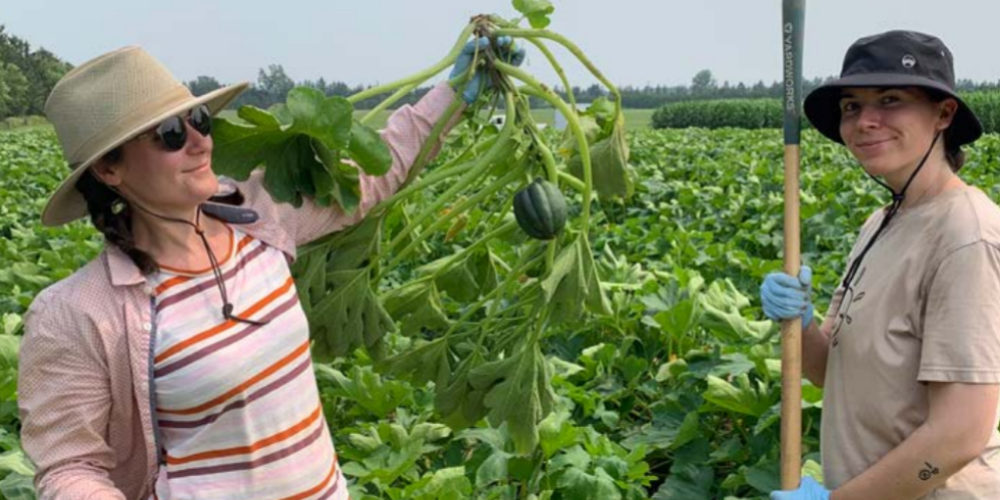The need to find more sustainable ways to produce food is urgent, with a world population predicted to reach nine billion by 2040 and ample proof of the adverse environmental effects of intensive agriculture.
With funding from Food from Thought, Dr. Kari Dunfield and her team are helping find ways of farming that can both meet global food requirements and protect the planet. “If farmers want to have sustainable agriculture, fight climate change and sequester carbon, they should be minimizing the chemical inputs,” she says. “If they want to do that, they want to promote the microbiome.”
Using Biologicals
In response to the demand for more ecologically friendly options, Dunfield says, that companies – even chemical companies – have been looking to add biological pesticides and fertilizers to their repertoire to reduce their carbon footprint.
“Using soil microbes as inoculants to encourage plant growth has been practised for thousands of years, but on a commercial level there’s only a handful of organisms that have been successful,” says Dunfield, who is a professor in the University of Guelph’s School of Environmental Sciences and the Canada Research Chair in the Environmental Microbiology of Agro-ecosystems. Dunfield says current biologicals lack consistent results, costing farmers money for the products and for potential crop failure. “We need to think about getting consistent results that farmers trust,” she says.
Dunfield and her team published a paper showing that soil science – along with microbiology and plant biology – has to be taken into account because of the complexities of the environment in which microorganisms live. Called “It takes three to tango – the importance of microbes, host plant, and soil management to elucidate manipulation strategies for the plant microbiome,” the paper was published in the Canadian Journal of Microbiology in May 2020.
The Importance of Field Research
Dunfield explains that researchers usually study microbes in a lab or greenhouse where many factors may affect their usefulness.
“We thought about it from two different perspectives – adding an inoculant into the system, but also exploring what kinds of practices a farmer could use to increase the native population of microbes that are already really good at promoting plant growth and controlling pathogens in the field,” she says.
“The systems are very complex, and you can’t expect to find one microbe that works in all field situations. The options were either selecting a plant that helps the micro-organisms live, introducing a group or consortium of micro-organisms that might work or encouraging the beneficial micro-organisms that are already in the soil.”
Dunfield says her team is looking at micro-organisms in systems that benefit plant growth either as bio-fertilizers or bio-controls for plant pathogens. Instead of seeking individual organisms, they’re examining functional groups such as nitrogen- or phosphorus-cycling organisms.
Collaborative Effort
The team is also looking at long-term research trials in crop rotation, reduced tillage and cover crops at the University of Guelph’s Ridgetown Campus.
“We know that they’re getting yield benefits out of some of these best management practices, so we’re using genomics to really understand what those microbial communities look like and how they interact,” says Dunfield, referring to a long-term cover crop trial being conducted by Dr. Laura Van Eerd, a professor in the School of Environmental Sciences.
“That trial has shown improved yields related to nitrogen for various cash crops, although the researchers need to learn more,” Dunfield says. In 2015, Dunfield’s team explored soil microbial communities in the Ridgetown research trials following a tomato crop. At that time it was after a tomato crop. They returned in 2020 after the planting of a corn crop with a new set of bioinformatics tools and identified microbes that were associated with different cover crops.
“We know that the cover crops are influencing which micro-organisms are there,” she says. “We’re starting to link changes in the microbial communities with changes in plant biomass and pathogens in the field.” Working with the researchers who are conducting long-term trials has been helpful for Dr. Dunfield’s work because those researchers are extremely knowledgeable and have gathered data under a variety of field conditions.
Her ultimate goal is to help find environmentally sustainable farming practices that promote healthy soil and consistently produce higher crop yields in all climate conditions.
This story is a part of the 2020-21 Food from Thought Annual Impact Report


